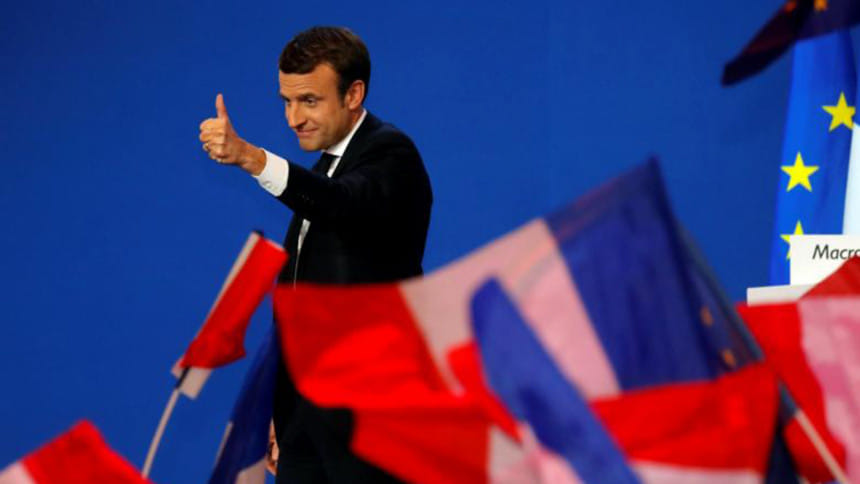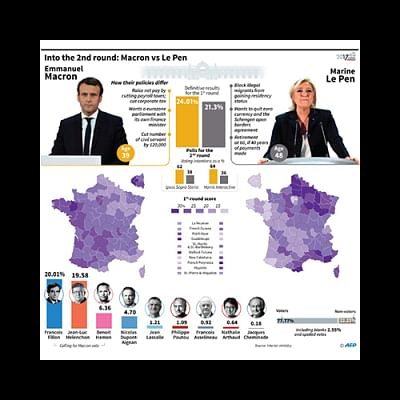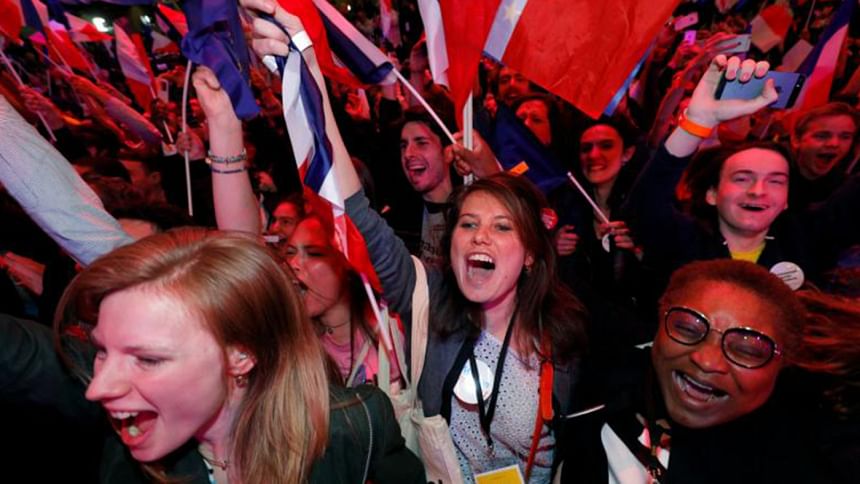Rise of a superhero in France

A newly formed party defeating two major political parties in an election sounds nearly impossible.
But it happened on Sunday in France.
The two major political parties that have run France for nearly 60 years have lost power in the presidential election. Voters have rejected the centre-right Republicans and the ruling Socialists.
The polling outcome, according to France24.com, has been described as an "earthquake", a "revolution", and a "leap into the unknown".
Socialist President François Hollande has become unpopular and opted for not to seek second term. He is the first president since 1958 who did not seek for second term. His party's candidate, Benoît Hamon, fell short even of his poll ratings, attracting just 6.35% of the votes.
Republican candidate François Fillon did much better than the ruling Socialists by securing 20 percent of the votes. But he could not enter second round of the polls in May.
The two major parties had to pay heavily due to internal feuds, and government's various polices hurting people's interests and alleged financial corruption.
Emmanuel Macron is the superman who led the ballot revolution with pro-people reform agenda. He entered the electoral race without the support of either of the two major political parties.
Aged only 39, Macron, a political novice, emerged as the would-be president of France. For this he needs to win the second round of election in May.
His En Marche! (Onwards!) that only emerged as a political movement in April 2016 defeated the two major parties.
Born into a middle-class family, Macron has served as the minister of economy, finance and industry in the outgoing Socialist government. He formed his party in April last year and quit the ministerial job in August to contest the presidential polls.
He has never before been elected to a public position, and had to resign from the cabinet as his Socialist colleagues increasingly disowned him and his ideas.
Macron, who obtained 24 percent of the votes, seems to have emerged as the saviour of France.

After graduating, Macron had worked as a financial inspector at the Ministry of Economy before joining Rothschild & Cie bank as an investment banker. Politically, he was a member of the Socialist Party for three years, before becoming an independent politician in 2009.
His first roles came under Hollande as a member of his personal staff and later as a minister for economy.
A year ago, when he launched his political movement, many thought he was doomed to failure.
"In just one year, we have changed the face of French politics," said a triumphant Macron.
President François Hollande in a televised address to the nation urged voters to back Macron in the second round ballot in May to defeat Marine Le Pen, who bagged 21.3 percent of the votes. Republicans also urged voters to support Macron to fight Le Pen.
Macron's win in the first round gave a sigh of relief to politicians in Europe. Hot on the heels of Brexit, the election in France is being held.
The far right politician Le Pen has long been campaigning against European Union. If elected as the president, she announced that she would call for referendum on France's staying in the EU.
In the referendum in UK last year people voted for leaving the EU. The UK has started process to leave the EU. In view of political analysts, the EU can not afford the shock if France follows the suit of UK.
Amid such a situation, Macron's win in the presidency will make it sure that France will not move against EU under his leadership.
BBC in a report said voters will be making a decision on France's future direction and on its place at the heart of the European Union.
If they opt for Emmanuel Macron, they will be backing a candidate who seeks EU reform as well as deeper European integration, in the form of a eurozone budget and eurozone finance ministers, said the report.

According to a recent poll, seven out of 10 French voters are opposed to France pulling out of the EU. Political analysts believe voters will favour Macron on the May 7 second round of the presidential election.
Far right wing leader Donald Trump's election win in USA in November made jubilant far right politicians in many European countries.
Many far right politicians in Germany, France, Italy, Greece, Austria, Netherlands and Hungary were first to congratulate Trump on election victory.
The rise of populist leaders sent a shock wave across EU, a politico-economic union of 28 member states which gradually developed after the World War II and worked effectively to stop war among European countries.
In December, Austrians rejected a far right leader in the presidential election. But far right wing won in the referendum in Italy resulting in resignation of Prime Minister Matteo Renzi.
After resignation of Italian prime minister in last December, French Prime Minister Manuel Valls said "Europe could die" in the face of "attacks from the populists".
On Sunday, Macron won, but France witnessed the rise of Le Pen too as the far right wing leader secured second position in the first round of the presidential election. Never before has her National Front (FN) attracted so many voters. So, France is not yet free from the possibility of being ruled by a far right wing leader. European Union is not free from the risk either.
What did we learn from France's election? BBC in a report mentioned five things we have learned from it. One of them is: "You do not have to be mainstream to win."

 For all latest news, follow The Daily Star's Google News channel.
For all latest news, follow The Daily Star's Google News channel. 



Comments